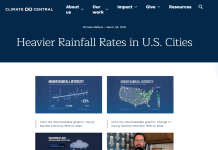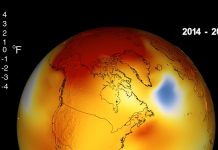A search of Google News for the term “climate change” today turns up a number of articles falsely claiming human climate change is causing increasingly extreme weather and more frequent power failures.
This is false. Data from the U.N. Intergovernmental Panel on Climate Change (IPCC) and the U.S. National Oceanic and Atmospheric Administration (NOAA) show extreme weather over the past century’s modest warming has not become more frequent or severe, and in some cases it has declined in frequency and severity. And any decrease in the reliability of the power grid is due to climate policies, not climate change.
The story titled, “Americans likely to experience more power outages due to climate change,” posted by KXAN (Austin, Texas’s NBC affiliate) is typical of the false claims made by myriad news outlets over the past week.
“If last week showed us anything, it is that climate change is real and we are not ready for it,” says KXAN. This is false.
As shown in Climate at a Glance: Heatwaves, data from NOAA demonstrates heatwaves have become far less frequent and severe in recent decades than they were in the early part of the 20th century.
Similarly, objective data destroy assertions that climate change is to blame for the extreme cold that struck Texas, Oklahoma, and elsewhere this past week. NOAA data show the number days each year with below-freezing temperatures in Texas is neither unusually high nor unusually low so far this century.
Similarly, NOAA data for neighboring Oklahoma show a decline in the frequency of very cold weather events in recent decades.
Data from NOAA and the IPCC make it equally clear other extreme weather events that might be thought to cause power failures, like cold spells, drought, floods, hurricanes, or tornados, have not increased in number or in severity as the earth has modestly warmed. You can see the evidence for yourself via the links in this paragraph.
Whether one it discussing instances of drought or flood, heatwaves or polar vortexes, science refutes any assertion that climate change makes weather extremes more frequent or severe.
While weather extremes aren’t increasing, policies enacted to prevent climate change are making the grid less reliable and flexible in response to peaks in power demand. In particular, state mandates to incorporate ever-greater amounts of intermittent wind and solar power, and federal and state subsidies for the same purpose, have resulted in the premature retirements of tens of thousands of megawatts of baseload coal power plants over the past decade. These power plants have been replaced by wind and solar industrial facilities which cannot be relied upon to provide a consistent flow of power to the grid because they are dependent on weather conditions. Nor can they be relied upon to provide on-demand power or peaking power during emergencies.
KXAN should not be trying to capitalize on a severe, but not historically unique, winter freeze in Texas to promote climate alarmism. The facts show weather extremes are declining. The main threat facing the nation’s electric power grid is not climate change, but rather government mandates to incorporate increasing amounts of intermittent, weather-dependent wind and solar power into the power system.
Replacing reliable sources of electric power, like coal, natural gas, and nuclear with ever more intermittent green power schemes makes power failures more likely, whatever the weather. That’s what KXAN should be reporting.

















